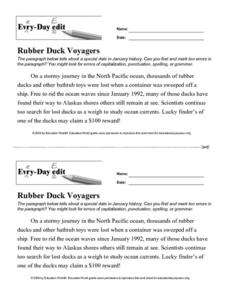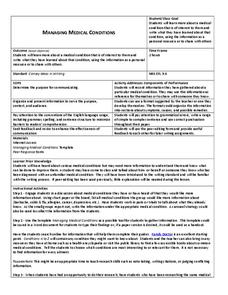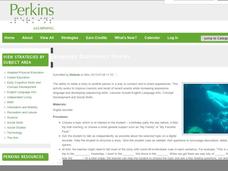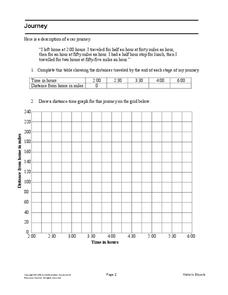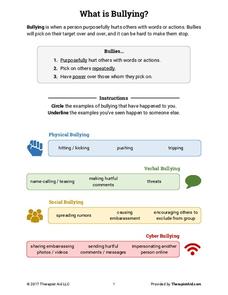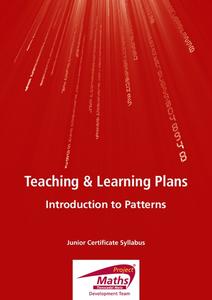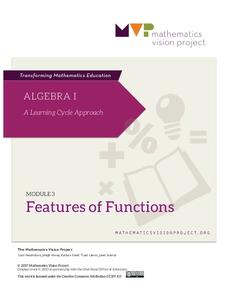Education World
Every-day Edit: Rubber Duck Voyagers
Learners correct errors in spelling and usage in a quick, six-line proofreading exercise. Makes a nice warm-up and reinforces editing skills. I've seen work like this called Daily Oral Language (D.O.L) practice; the class reviews the...
Education World
Every-day Edit: Hobo Turned Poet
Pupils proofread a short paragraph about Carl Sandburg. The errors span capitalization, punctuation, spelling, and grammar. Useful as a warm-up and language conventions review. Go over it together as a class verbally and have individual...
Education World
Every-Day Edit: Ida B. Wells
Practice language convention usage with this brief proofreading exercise. Together your class can verbally correct grammatical mistakes in a short paragraph about Ida B. Wells. Then individual learners can rewrite it or mark the hard...
Curated OER
Managing Medical Conditions
Your scholoars practice organizing and presenting information through written language. They gather information about a medical condition and share it with someone else. They then use a format where they organize their information using...
Curated OER
Matching Directions
These abstract shapes are pointing in different directions and young scholars determine which ones are oriented the same way. For each of five starting shapes they examine a set of four identical figures pointing in various directions,...
Curated OER
Adding Up
Make addition visual in order to help beginners understand the concept. They add up beads on a string, examining an example before trying it on their own. Learners fill in addends and sums for these, and sometimes both....
DK Publishing
The Same
Combine color, size, and shape recognition for youngsters using this set of shapes. They follow the directions to color big triangles red and small circles blue, then count and record the number of red triangles and blue circles....
Curated OER
Equal Value
Which coins add up to these values? Young mathematicians examine five cent values, circling the coins needed to amount to them. Next, they compare money values in four sets of coins. First, learners add up each set to find the total...
Curated OER
Congruent Shapes
Which of these shapes is congruent? Young geometers examine five familiar shapes: triangle, oval, rectangle, triangle, and circle. Each is followed by a set of shapes, of which one is congruent. They circle the congruent...
DK Publishing
2 Fewer Than
Which set has two fewer? Young counters practice with numbers 0-10 and beginning subtraction concepts, focusing on the key term fewer. They examine two sets of undersea animals and check the one with two fewer than the other....
Curated OER
Identifying Patterns
What's the pattern? Youngsters examine four sets of sequential images to detect a pattern and continue it onto a fourth image. Ask them to verbalize what they noticed and how they continued this pattern. Consider extending the concept...
Perkins School for the Blind
Tactile Journals
I absolutely love this idea. Children with visual impairments create tactile journals which describe an event from the previous week in an artistic way. They verbally describe one event from the previous week and then use a wide array of...
Perkins School for the Blind
Put the Shoe on Your Foot
Promote clothing identification, body part identification, and dressing skills acquisition with a fun and lively game. Each child takes turns grabbing a clothing item from the central clothing box. As he puts the item on, he sings,...
Illustrative Mathematics
Guess My Number
Make a game out of solving equations. This particular activity works well for pairs of learners. Follow the instructions to have player one pick a number and player two verbally give an equation. Participants need to make sense of a...
Perkins School for the Blind
Language Experience Stories
Here is a great way to bring core content to your special education classroom. Included is a set of instructional ideas intended to help learners increase their verbal and written expression through storytelling. Tape recorders, story...
Tobii Dynavox
Sono Flex
Empower nonverbal learners with the gift of gab using this speech and language application. Offering hundreds of picture-supported words and phrases, it's easy for students who struggle with verbal communication to have meaningful...
Positively Autism
"Trick or Treat" Cards
Perfect for non-verbal learners, these Trick or Treat cards say thanks in a big way. Children with autism can hand this Happy Halloween thank you card to houses visited or can wear a big copy attached to their costume.
Mathematics Assessment Project
Journey
Drive home math concepts with an engaging task. Learners follow a verbal description to fill in a table and create a distance-time graph representing a car journey. They then answer questions by interpreting the graph.
Mathematics Assessment Project
Circle Pattern
Cool circle patterns! To investigate patterns of shading in circles, learners use the values for specific examples of the pattern to generate a verbal rule for the arrangement.
Mathematics Assessment Project
Sorting Functions
There's no sorting hat here. A high school assessment task prompts learners to analyze different types of functions. They investigate graphs, equations, tables, and verbal rules for four different functions.
Therapist Aid
What is Bullying?
What is the definition of bullying, and how can you deal with it? Elementary and middle schoolers discuss verbal, physical, social, and cyberbullying before talking about strategies to avoid and stop bullying in their school.
CK-12 Foundation
Determining the Equation of a Line: Trip Functions
Let the function drive the activity. The interactive displays the odometer on a car for a trip. Pupils determine and interpret the slope of the situation. Then, they find a verbal description of the equation of the function.
Project Maths
Introduction to Patterns
The world is full of patterns. Help learners quantify those patterns with mathematical representations. The first Algebra lesson in a compilation of four uses a series of activities to build the concept of patterns using multiple...
Mathematics Vision Project
Module 3: Features of Functions
Learn how to represent functions in multiple ways. Learners analyze functions as equations, graphs, and verbal descriptions. The analysis includes intercepts, behavior, domain, and range. The module of seven lessons makes up the third...
Other popular searches
- Verbal Communication
- Non Verbal Communication
- Examples of Verbal Irony
- Non Verbal Communication
- Algebra 2 Verbal Equations
- Verbal Communication Skills
- Verbal Irony
- Non Verbal Language
- Verbal Irony Cartoons
- Verbal Expressions
- Verbal Demonstration
- None Verbal Communication
